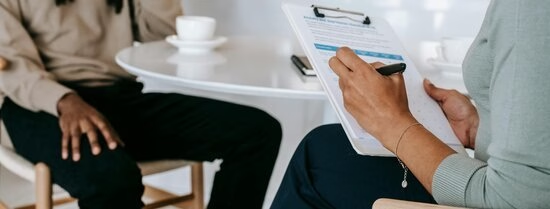The job application process needs to change to create equal opportunities. That is the conclusion of the recent EUR study by occupational and organisational psychologist Janice Odijk. But what about the application process at our university? And how does the process of applying anonymously at the University Library work? HR officers Mark Baas and Katarina Putnik, and Petra Busstra of the University Library explain.
'I really appreciate that the study looked at the experience of applicants, which is something that is often left out in scientific research on selection,' says Recruitment & Employer Branding project manager Mark Baas. 'Furthermore, the research confirms some things we already knew from other studies, for example that a structured way of interviewing helps to avoid bias (preferences). We therefore want to start working with a structured approach to job interviews, with predefined questions and an answer matrix. But because our university is decentralised, it will take time to implement it throughout the entire university at once. We are currently having meetings about implementing the changes.' In addition, Mark says that the recommendations from Odijk's survey will also be incorporated into internal recruitment and selection training.

'Why change a winning team?'
'You sometimes hear people say, "Our way of recruitment and selection works fine, why should we change it?",' says dr. Katarina Putnik, senior HR Policy Advisor Diversity & Inclusion. 'But just because it has worked well in the past doesn't mean it can't improve, look at the conclusion of the research. If we select candidates in a more objective way, which we already give guidelines for in our current policy, we look more at the qualities of individuals. The side effect of this is that the person chosen may then also contribute to the diversity of the department.'
Mark and Katarina are seeing more and more initiatives from different departments. For example, the University Library has been successfully recruiting anonymously since 2020. Petra Busstra, head of the Digital Resource Management department at the University Library, explains how this was introduced. 'Our director attended a meeting on unconscious bias and around the same time we had training session on diversity and inclusion. After that, it was decided quickly that we wanted to introduce anonymous job applications,' Petra says. 'With that statement, we put the UB on the map as an inclusive organisation where anyone is welcome.'

'Applying anonymously removes a barrier'
An anonymous application process entails that the library asks candidates to send their cover letter and CV anonymously. Based on that, applicants are selected. It isn’t until the first interview that the employer finds out who you are dealing with. The UB gets a lot of positive feedback from applicants. 'People indicate that applying anonymously removes a barrier for them, making them feel invited to respond,' Petra explains. 'That was our goal and we have achieved that with this process.' The UB team is international in composition, and according to Petra, people of colour, for example, are well represented. 'Whether that is because of anonymous application we are not sure, but we hope and think so.'
Of course, it also has disadvantages. 'When applicants call because they have a question, it takes away a bit of anonymity,' Petra explains. 'Sometimes you can tell from someone's CV what their background is, for example if they have worked and studied in one particular country, or if someone grew up bilingual.' Petra points out that there is definitely room for improvements, for instance by using a pre-standardised questionnaire - one of Odijk's recommendations - instead of a CV. This would also solve the problem stated above. 'Of course, prejudices can still occur at the first introduction, that's human nature. But I think because we work with anonymous applications, the selection team is more aware of this and handles it more carefully.'
Surprise!
'You do subconsciously create a picture in your head of what kind of person someone is,' Petra admits. 'I sometimes thought someone was old because of their wording, but it turned out to be a young person. That's what I like about it, I get surprised every time.'
- More information
Are you inspired by the way the University Library selects employees and do you want to ask Petra a question? Get in touch with her through petra.busstra@eur.nl.
Do you have questions about the recruitment and selection process? Please get in touch with Mark through mark.baas@eur.nl or Katarina through katarina.putnik@eur.nl.
- Related content

